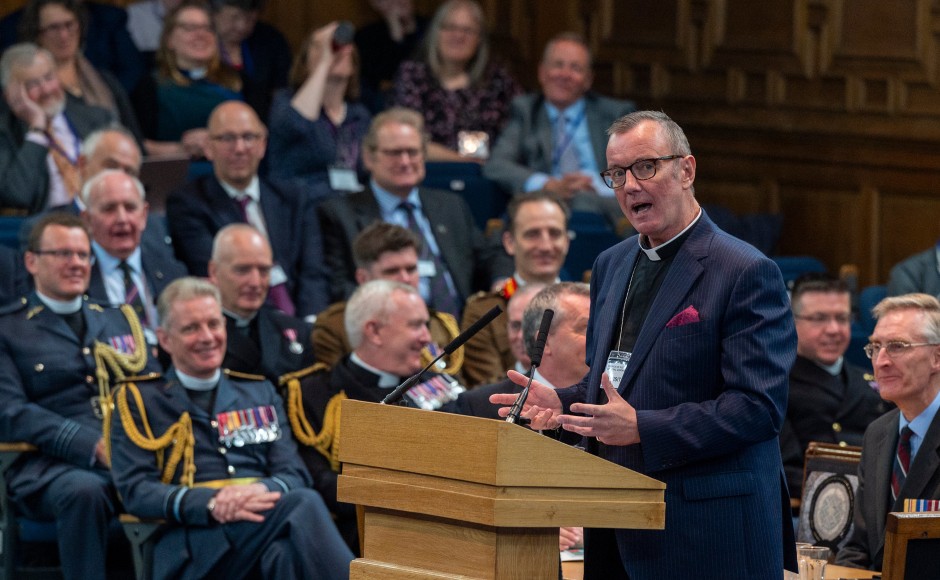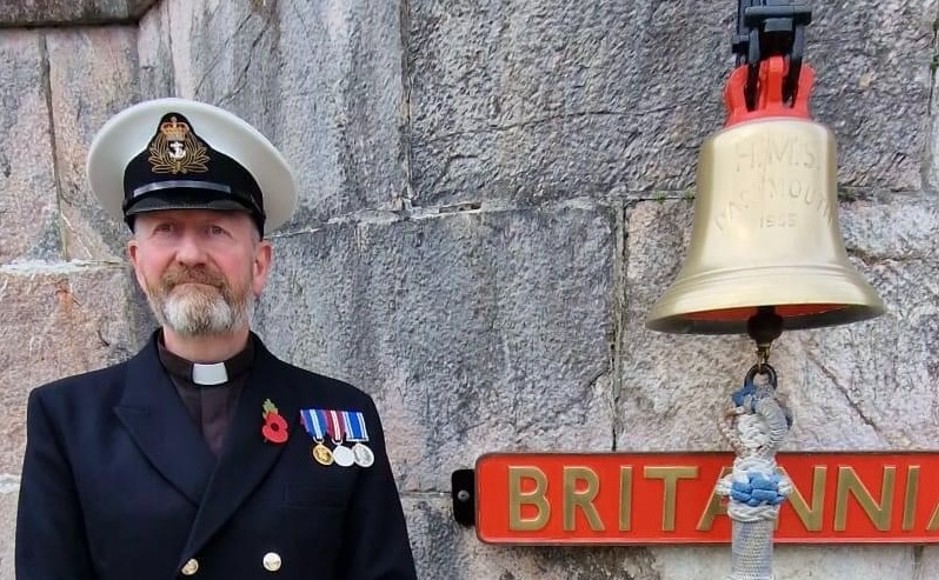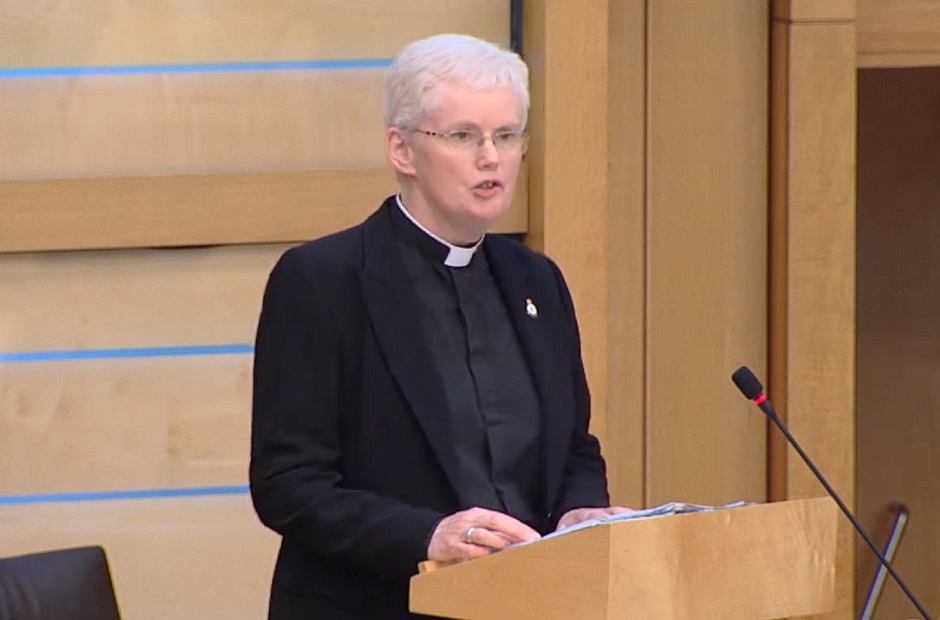Chaplains hold key role in modern armed forces
Published on 25 May 2022
Padres, like ammunition, will always be in demand by military commanders, a senior British Army officer has told the General Assembly.
Lieutenant General Nick Borton, commander of NATO's Allied Rapid Reaction Corps and Colonel of the Royal Regiment of Scotland, Scotland's infantry regiment, thanked the Kirk for the contribution its chaplains continue to make to the welfare of those serving in the armed forces.
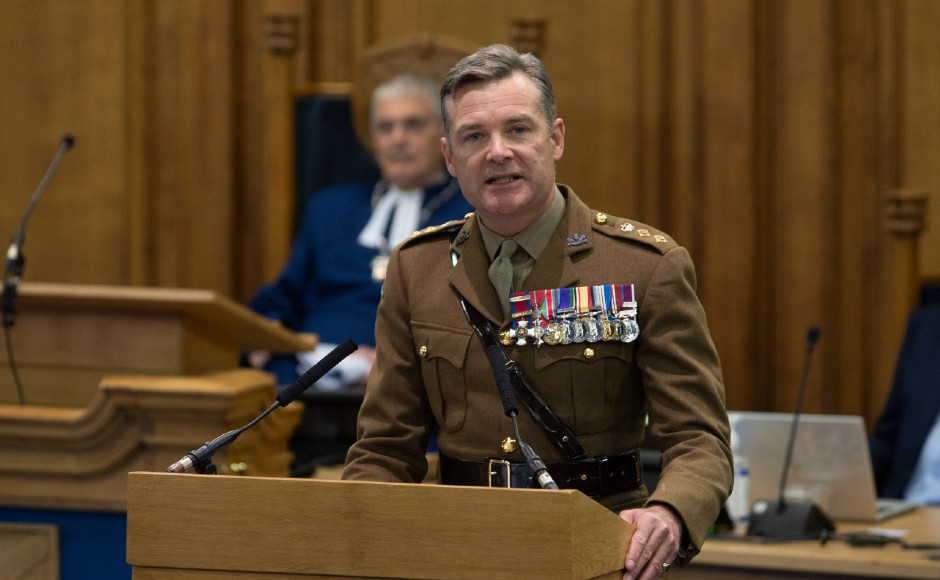
He was representing the military as the General Assembly in Edinburgh heard from the Kirk's Committee on Chaplains to HM Forces on the work of chaplains with all three armed services, as well as cadet and reserve units.
Grim and appalling situation
Lieutenant General Borton's acknowledged that his appearance came "at a most grim and appalling time in international affairs" when the shadow of major war had once again fallen across Europe.
However, he said the conflict in Ukraine underlined an inescapable military truth— that war is still fundamentally an activity of the human heart and spirit.
Lieutenant General Borton, who was commissioned into the Royal Highland Fusiliers in 1991, said: "It is the spirit of resistance and unity which has defined the extraordinary performance of the Ukrainian army and people.
"It is no surprise therefore that the Russian forces have deliberately targeted Ukrainian churches and priests in their attempts to break the spirit of the Ukrainian people.
"It proves what we have long recognised in the British Army and our sister services, that over and above all the paraphernalia of war – the most important thing is the human spirit and morale of your soldiers."
Religion remains important
While Kirk Parade was no longer a compulsory part of army life, Lieutenant General Borton believes religion remains enormously important to those serving in the armed forces.
"Indeed, in a profession where one explicitly accepts the possibility or likelihood of one's own death; it's surprising that more soldiers would not subscribe to a faith which offered the possibility of everlasting life," he said.
Drawing on examples from history, such as Padre Studdert Kennedy, World War I's famous "Woodbine Willie", and Chaplain Selwyn Thorne, who dropped into Arnhem by glider, Lieutenant General Borton also referred to his own experience to demonstrate the important part padres play in the armed forces.
"I well recall in Afghanistan being particularly worried about one of my companies who were isolated and having a hard time," he said.
"Instead of a Headquarters officer, I decided to send the padre down to look after them; and he rallied them wonderfully, not only with spiritual and moral sustenance, but with real leadership too.
"Like ammunition, commanders on operations always need more padres."
Lieutenant General Borton said he has mostly served with Church of Scotland chaplains.
"The Church of Scotland, if I may say so, is ideally suited to the provision of chaplains; for you are very accessible, which is important for soldiers, and not overly wedded to traditionalism and doctrinalism; very important for an organisation based almost entirely on young people," he added.
"We have constant need of our Woodbine Willies and Padre Thornes every day, and we couldn't do it without them.
"I close with an appropriate line from the second book of Timothy which summarises their service: ‘Endure hardship with us, like a good soldier of Jesus Christ.'"
An emotional moment
The role of military chaplains was also underlined by Rev Dr. Marjory MacLean as she presented the report from the Church of Scotland Committee on Chaplains to HM Forces.
"I'd like to share why I think military chaplaincy is one of the most profoundly important things our Church does," said the committee convener.
"I could talk of the reach of the Church to thousands of young active adults that are not otherwise reached by us.
"I could talk of the contribution of Christian wisdom to the moral component of the most difficult and dangerous elements of national life.
"I could talk of the wonderful wealth of experience, skill and understanding that chaplains bring into later civilian ministry.
"But instead I'm just going to describe the single most emotionally difficult moment of my own ministry, as a reservist chaplain."
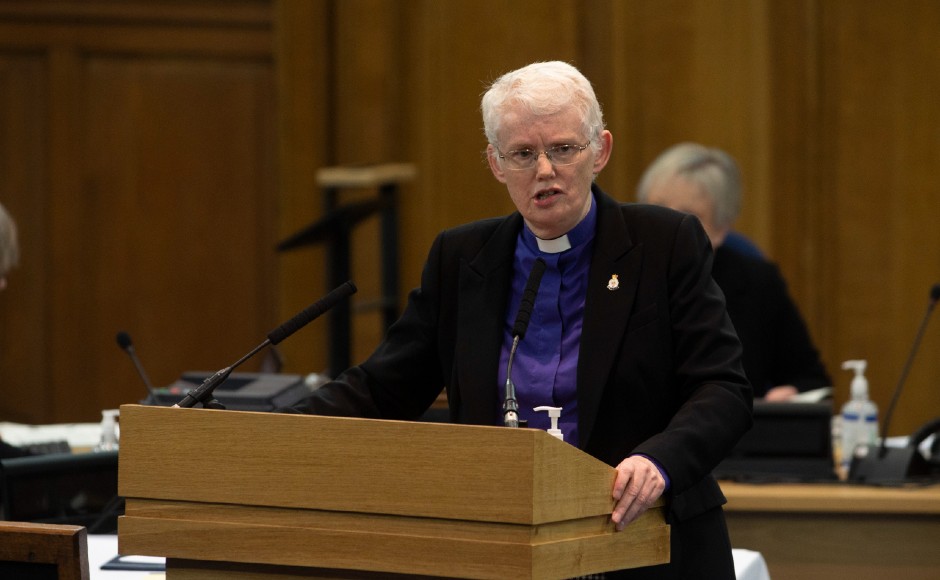
Serving as chaplain with Royal Navy survey vessel HMS Enterprise, Dr MacLean, a parish minister on Orkney, was involved in rescuing migrants attempting to flee North Africa in overcrowded rubber boats for a new life in Europe.
Among the more than 700 squeezed onto HMS Enterprise's quarterdeck, was a French-speaking woman from East Africa whose sister had died during the voyage from Libya.
Dr MacLean told the General Assembly: "I was called for to pray with her, and I brought with me a young officer whose recent degree happened to be in French.
"I extemporised a prayer, with my young colleague at my shoulder translating as best he could.
"And then, suddenly, the sorrowing figure took a breath and began to pray; desolate, lamenting prayer, desperate, fast prayer, too fast for the young lieutenant beside me to keep up with translation.
"It didn't matter to me what she was saying; she was praying now her own sorrow and need, and I only needed to keep holding her hands.
"That, Moderator, is what these ministers do."
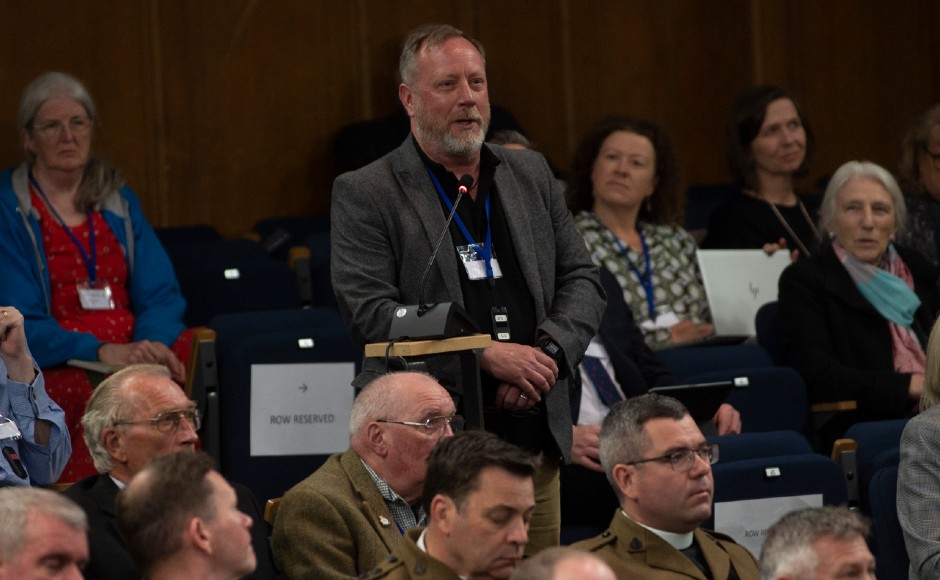
Rev Craig Dobney, minister of Comrie linked with Dundurn churches in Perthshire, paid tribute to the chaplains who helped him get through difficult times when he was an avionics engineer in the RAF.
He served with 43 Squadron at RAF Leuchars in Fife and saw active service in far flung places across the globe including the Falklands, Middle East and Baltic region.
A veteran of both Gulf wars, he told the General Assembly: "I served for 22 years in the RAF and when I first joined up I was lost to God even though I was brought up in a church family.
"Throughout my career my faith slowly came back, mainly because of the support and care we got from our chaplain teams in whichever squad I was working with at that time.
"My son is in the army now and we as parents worry about him all the time.
"He has served in Afghanistan and Iraq and says ‘don't worry about me, I have the guys I work with and I also have my chaplain'.
"To him, the chaplain is the parent looking after the boys and girls in these conflict areas.
"And that is what I felt like throughout my career that when my parents weren't there to help me through difficult times, the chaplain was the one who was available whether in the station church or more likely the squadron bar."
Ecumenical work
Very Rev Dr John Chalmers, the outgoing convener of the General Trustees of the Church of Scotland, paid tribute to the work of chaplains.
He told the General Assembly that it was 11 years ago tomorrow when his son JJ Chalmers was blown up in Afghanistan.
The former Royal Marine turned broadcaster was seriously injured in an improvised explosive device (IED) blast in Helmand Province.
Dr Chalmers said: "When we arrived at the hospital in Birmingham when he was brought back from (Camp) Bastion it was a Roman Catholic chaplain, Father Mike Sharkey, who was the person who held our hand.
"I am proud of every Church of Scotland minister who serves in chaplaincy but it is one of the places where ecumenical work within the life of the church is at its most vibrant.
"It is the one place where you can be absolutely sure that nobody asks whether you are right footed or left footed, all that matters is that you have someone whose hand you can hold who is holding the hand of God when you don't know how to be able to do that.
"Thank you to you all."
Watch the General Assembly 2022
The 2022 General Assembly runs until Thursday 26 May at the Assembly Hall on The Mound in Edinburgh.
The event will be livestreamed through the Church of Scotland website, with highlights shared each day through the website, Facebook and Twitter.
